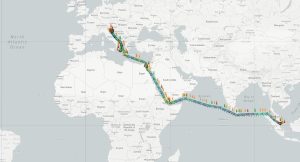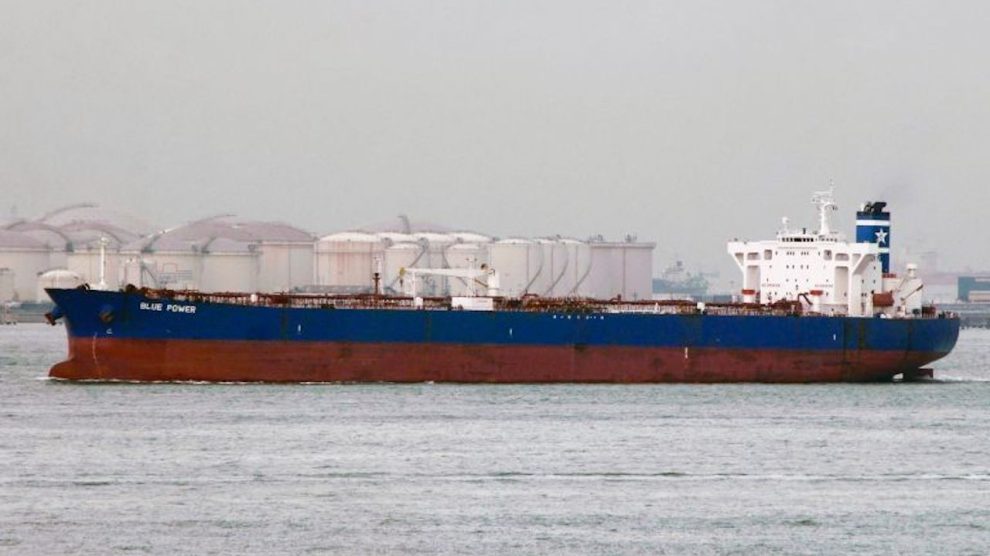The mysterious ship. A tanker has been oddly shuttling for two weeks in the Adriatic Sea. It has been in the port of Rijeka since May 21. It’s called ARC 1, it flies the Panama flag, and it was registered in the name of a Marshall Islands shell company, Silver Coast. And it may be carrying Iranian oil.
- It departed in mid-March from Malaysia and crossed the Arabian Sea, entered the Red Sea, passed the Suez Canal and sailed up the Mediterranean Sea.
- It then made its way to Croatia, then to Italy, and then back to Croatia, where it’s anchored now.

It smells fishy. Company records link the Silver Coast to a Singaporean company, Tianjin Shipping Ventures Private, which has operational ties to at least two other ships that regularly engage in ship-to-ship transfers of oil loaded in Iran, as reconstructed by Richard Meade, editor of the trade journal Lloyd’s List.
Here’s how it played out. “Only hours before the vessel changed course, a series of letters were sent to management at the port of Rijeka, port agents and Croatian refineries, reminding all of the US sanctions policy regarding Iranian crude,” he wrote.
- The letters were sent by United Against Nuclear Iran, a US-based group advocating against the nuclearisation of Iran and working on various fronts to prevent it.
- A spokesman for Janaf, the Croatian entity responsible for managing the storage and transportation of oil, later told Lloyd’s List that it had “not received the nomination of the vessel in subject from any of our clients.”
Does oil ship-hop? UANI had attached satellite photos to show that ARC 1 had loaded Iranian crude on April 2 through a ship-to-ship transfer from another tanker, the Vigor, off Malaysia.
- The Vigor had itself been tracked through Lloyd’s List Intelligence data and photographed by satellites while loading oil from the Iranian island of Kharg on March 14.
- Operators may also have felt that additional masking of a second operation – with the Marshall Islands-linked tanker CS Prosperity four days later – would have been sufficient to ensure that the shipment would not be identified as Iranian crude, Lloyd’s List wrote.
Warning: the United States “will continue to strictly enforce sanctions on Iran’s illicit oil trade. Anyone purchasing oil from Iran faces the prospect of US sanctions,” reminded Treasury Undersecretary Brian E. Nelson while announcing a new round of sanctions against the Islamic Revolutionary Guard Corps-Qods Force (IRGC-QF) officials and their black gold “smuggling network”.
A first? If it had been successful, ARC 1’s shipment would have been the first delivery of an Iranian cargo to Croatia since 2018 (and to Italy, too). However, the tanker stopped in Trieste only to refuel before departing for Rijeka.
- UANI’s campaign to identify Iranian shipments and give them visibility in the media seems to have spurred something: more companies are seeking legal assistance to manage the perceived risk of being linked to such a story, even if the trade itself is legally permissible, Llyod’s List wrote, citing industry lawyers.
UANI speaking. “As Europe looks to shift away from importing Russian oil, European countries should be skeptical of Iran,” said Claire Jungman, Chief of Staff at UANI, to Decode39. “Vessels carrying Iranian oil repeatedly engage in deceptive practices to obscure the true origin of the oil”.
- She explained that ARC 1’s oil originally came from Kharg Island in Iran and was transferred abroad via other ships.
- The tanker then “engaged in another ship-to-ship transfer likely to rebrand the Iranian oil. These repeated ship-to-ship transfers are a common technique we see from Iran, in addition to spoofing of AIS transponders,” – that is, drawing up false routes, explained the expert.
- “Those looking to purchase alternatives to Russian oil should look very carefully at the past track of the vessels and conduct robust due diligence to determine the true origin of the cargo,” she concluded.
The COPASIR report. Examining the energy security consequences of the Russia-Ukraine conflict, COPASIR – the Italian Parliament’s intelligence committee – indicated how Iran could “once again become a major partner.”
- The conflict in Ukraine “has provided a new impetus for the resumption of nuclear agreements between the US and Iran, which, although opposed by Israel and some Arab countries, could give rise to new balances in the energy game,” reads the document.
- It goes on to say that “Italy could take advantage of its excellent trade relations with [Iran], which could be an alternative gas outlet to replace Russian gas.”
- “Moreover, Tehran has expressed its intention to build a fleet of LNG carriers and ships as it aims to develop its own LNG industry. Thus, this prospect could also represent an opportunity for the Italian market.”
The experts’ take / 1. “The current political and technical conditions, as well as the high level of future uncertainty, severely limit [Iran]’s real replacement potential”, noted Jacopo Scita, Al-Sabah doctoral fellow at the School of Government and International Affairs at Durham University.
The experts’ take / 2. Currently, “Iran’s gas production goes almost entirely to meet domestic demand.” Thus, it can hardly become a major partner for Italy in the short-to-medium term, explained Annalisa Perteghella, senior policy advisor at the Italian think tank ECCO. There are complexities even at the infrastructural level, she added.
JCPoA and sanctions. COPASIR itself noted the potential issues relating to US sanctions and the possible restoration of the Iran nuclear agreement.
- “As with US engagement with the regime in Venezuela, necessity makes some strange bedfellows,” wrote Robin Mills, non-resident fellow at the Arab Gulf States Institute in Washington and managing director of Qamar Energy. “A post-sanctions Iran would be an important part of replacing Russian hydrocarbons – but its limited impact just emphasises the scale of the task. A revived JCPOA would untangle some energy knots while tightening others.”




